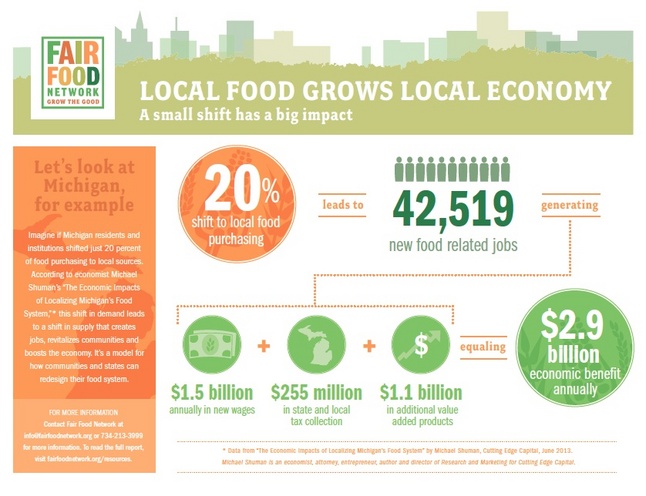Community kitchens and connectors developing to foster new food businesses

Michael Shuman says shifting to 20 percent local food in Michigan would create benefits including as many as 42,519 jobs and $1.5 billion in new wage income.
From the Fair Food Network website
There are lots of dimensions to growing a strong local food economy, and preserving farmland, getting new farmers going, and strengthening existing farms are only part of the equation. The entrepreneurs and food businesses who depend on that food production are another aspect.
In a recent report sponsored by the Fair Food Network called "The Economic Benefits of Food Localization for Michigan and The Capital Required to Realize Them," author Michael Shuman examines how a 20 percent shift to local food would affect 52 sectors of the Michigan food economy.
He says, "A 20-percent shift could create as many as 42,519 new jobs — 18,412 directly in new food businesses."
According to Shuman, that would translate into $1.5 billion in new wage income and another $255 million in state and local taxes. Shuman says a 20 percent shift to local food also achieves benefits like: stronger community economies, ecological sustainability, better nutrition and health, and more civic engagement.
He says that the only "plausible argument not to promote local food is a concern that local food sometimes costs more than mainstream food." He adds that "as local food businesses grow and spread, particularly infrastructure businesses like food hubs, prices will begin to adjust downward."
So what's going to help new food businesses get started? The Michigan Cottage Food Law created in 2010 helps folks who want to make jam or granola or other "non-potentially hazardous foods" sell up to $20,000 worth of out of their own kitchens.
But to go beyond that, organizations across the state are developing ways to connect startup food entrepreneurs with the facilities and resources they need to develop their businesses.
In Washtenaw County, the Chelsea Community Kitchen is a nonprofit organization "connecting food entrepreneurs, educators and local food enthusiasts with kitchens they can rent; providing education and counseling support for people who want to start or grow a food-based business using local ingredients; and educating consumers about eating local and healthy."
And recently the Washtenaw Food Hub (of which I am a member) released a commercial kitchen "interest survey" to gather feedback about what kind of facilities and support food businesses in the area are seeking.
In Detroit, a release from the newly launched Detroit Kitchen Connect says, "There is nothing easy about launching a food business. One of the biggest obstacles for starting a food business in Detroit (or anywhere) is the high cost of setting up a commercial kitchen. Detroit Kitchen Connect (DKC) exists to help you overcome that obstacle. We aim to increase entrepreneurial success by providing a supportive, diverse, inclusive community along with access to commercial, licensed kitchen facilities and equipment in a reduced risk environment."
Commercial kitchens designed for community benefit are developing across the state including the Allen Street Marketplace and Incu-Bake "incubator kitchen" in Lansing, the Uptown Kitchen and the new Downtown Market in Grand Rapids, the Can-Do Kitchen in Kalamazoo, and the Manistee Community Kitchen .
So if you were thinking about starting up a food business, there's never been a better time, because there's probably a new kitchen incubator or connector near you.
Kim Bayer is a freelance writer and culinary researcher. Email her at kimbayer at gmail dot com.

